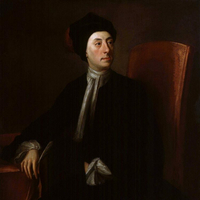An Ode - Inscribed to the Memory of the Hon. Colonel George Villiers
Say, dearest Villiers, poor departed friend,
(Since fleeting life thus suddenly must end)
Say, what did all thy busy hopes avail,
That anxious thou from pole to pole didst sail,
Ere on thy chin the springing beard began
To spread a doubtful down and promise man?
What profited thy thoughts, and toils, and cares
In vigour more confirmed and riper years,
To wake ere morning-dawn to loud alarms,
And march till close of night in heavy arms,
To scorn the summer’s suns and winter’s snows,
And search through every clime thy country’s foes?
That thou might’st Fortune to thy side engage,
That gentle Peace might quell Bellona’s rage,
And Anna’s bounty crown her soldier’s hoary age?
In vain we think that free-will’d man has power
To hasten or protract th’ appointed hour.
Our term of life depends not on our deed:
Before our birth our funeral was decreed.
Nor awed by foresight, nor misled by chance,
Imperious Death directs his ebon lance,
Peoples great Henry’s tombs, and leads up Holben’s dance.
Alike must every state and every age
Sustain the universal tyrant’s rage,
For neither William’s power nor Mary’s charms
Could or repel or pacify his arms.
Young Churchill fell as life began to bloom,
And Bradford’s trembling age expects the tomb.
Wisdom and Eloquence in vain would plead
One moment’s respite for the learned head;
Judges of writings and of men have died,
Maecenas, Sackville, Socrates, and Hyde;
And in their various turns the sons must tread
Those gloomy journeys which their sires have led.
The ancient sage, who did so long maintain
That bodies die, but souls return again,
With all the births and deaths he had in store,
Went out Pythagoras, and came no more.
And modern Asgyll, whose capricious thought
Is yet with stores of wilder notions fraught,
Too soon convinced, shall yield that fleeting breath
Which play’d so idly with the darts of Death.
Some from the stranded vessel force their way;
Fearful of fate they meet it in the sea:
Some, who escape the fury of the wave,
Sicken on earth, and sink into a grave.
In journeys or at home, in war or peace,
By hardships many, many fall by ease.
Each changing season does its poison bring,
Rheums chill the winter, agues blast the spring:
Wet, dry, cold, hot, at the appointed hour,
All act subservient to the tyrant’s power;
And when obedient Nature knows his will
A fly, a grape-stone, or a hair can kill.
For restless Proserpine for ever treads
In paths unseen, o’er our devoted heads,
And on the spacious land and liquid main
Spreads slow disease, or darts afflictive pain:
Variety of deaths confirms her endless reign.
On cursed Piava’s banks the goddess stood,
Show’d her dire warrant to the rising flood,
When he I long must love and long must mourn
With fatal speed was urging his return,
In his dear country to disperse his care,
And arm himself by rest for future war,
To chide his anxious friends’ officious fears,
And promise to their joys his elder years.
Oh! destined head; and, oh! severe decree,
Nor native country thou nor friend shalt see;
Nor war hast thou to wage, nor year to come,
Impending death is thine, and instant doom.
Hark! the imperious goddess is obey’d;
Winds murmur, snows descend, and waters spread.
Oh! Kinsman, Friend - Oh! vain are all the cries
Of human voice, strong Destiny replies:
Weep you on earth, for he shall sleep below;
Thence none return, and thither all must go.
Whoe’er thou art, whom choice or business leads
To this sad river, or the neighbouring meads,
If thou may’st happen on the dreary shores
To find the object which this verse deplores,
Cleanse the pale corpse with a religious hand
From the polluting weed and common sand;
Lay the dead hero graceful in a grave,
(The only honour he can now receive)
And fragrant mould upon his body throw,
And plant the warrior-laurel o’er his brow;
Light lie the earth, and flourish green the bough!
So may just Heaven secure thy future life
From foreign dangers and domestic strife;
And when th’ infernal Judge’s dismal power
From the dark urn shall throw thy destin’d hour;
When, yielding to the sentence, breathless thou,
And pale shalt lie, as what thou buriest now,
May some kind friend the piteous object see,
And equal rites perform to that which once was thee!

